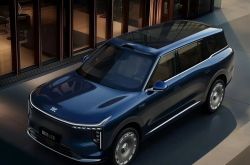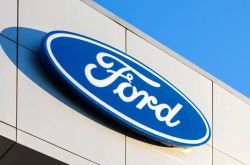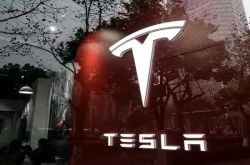Asian Auto Market | Chinese Cars in Israel, April 2025: Chery, XPeng, and Lynk & Co. Accelerate Market Penetration
![]() 05/08 2025
05/08 2025
![]() 626
626
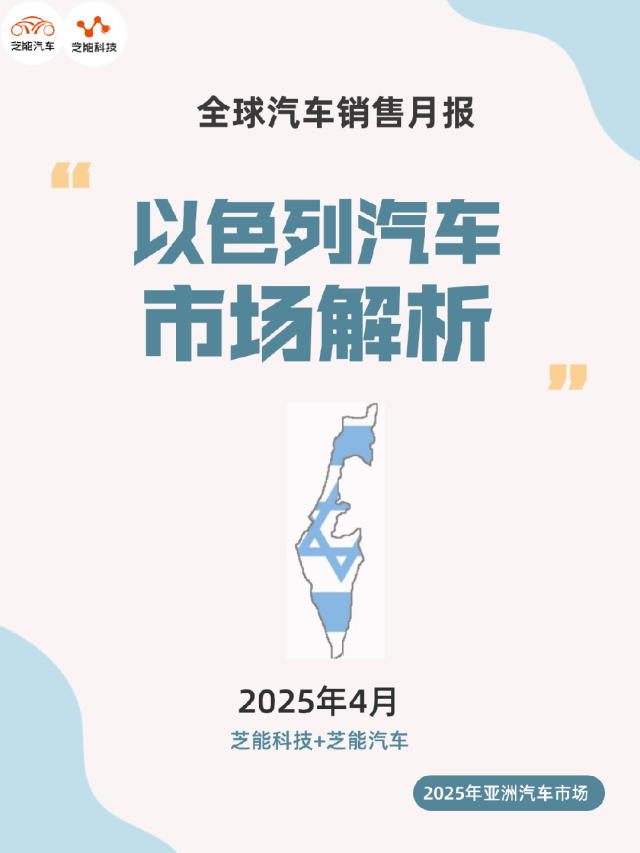
In April 2025, Israel's new car market maintained its upward trajectory, with monthly sales surging 10.1% year-on-year and cumulative sales up 9.2% since the beginning of the year.
Amidst a market dominated by Japanese and Korean brands, Chinese automakers have risen swiftly. Chery, XPeng, BYD, and MG continue to make strides, with Chery leaping to fourth place in brand sales, XPeng ranking in the top ten for three consecutive months, and Lynk & Co. experiencing a remarkable 700% year-on-year growth. These achievements underscore the robust market resilience and product appeal of Chinese electric vehicles.
Israel's embrace of China's new energy vehicles and intelligent models is accelerating, significantly contributing to the "second front" of overseas expansion for Chinese automakers.
01
Overview of Israel's Auto Market:
Traditional Powers Remain Strong, New Energy Penetration Accelerates
In April 2025, Israel sold a total of 19,568 new light vehicles, marking a 10.1% year-on-year increase. Cumulative sales for the first four months reached 116,658 vehicles, up 9.2% year-on-year.
Structurally, while Japanese and Korean brands still dominate the market, the penetration of Chinese brands and new energy models is steadily growing.
From the brand rankings:
◎ Toyota led the pack with 2,890 vehicles sold, accounting for 14.8% of the market share and a 10.6% year-on-year increase, maintaining its traditional stronghold in the Israeli market.
◎ Hyundai closely followed with 2,810 vehicles sold, thanks to a stunning 69.8% year-on-year increase, pushing its cumulative sales ahead of Toyota, accounting for 13.5% of the year.
◎ Kia experienced a sharp decline, down 23.3% year-on-year, with its market share falling to 7.0%.
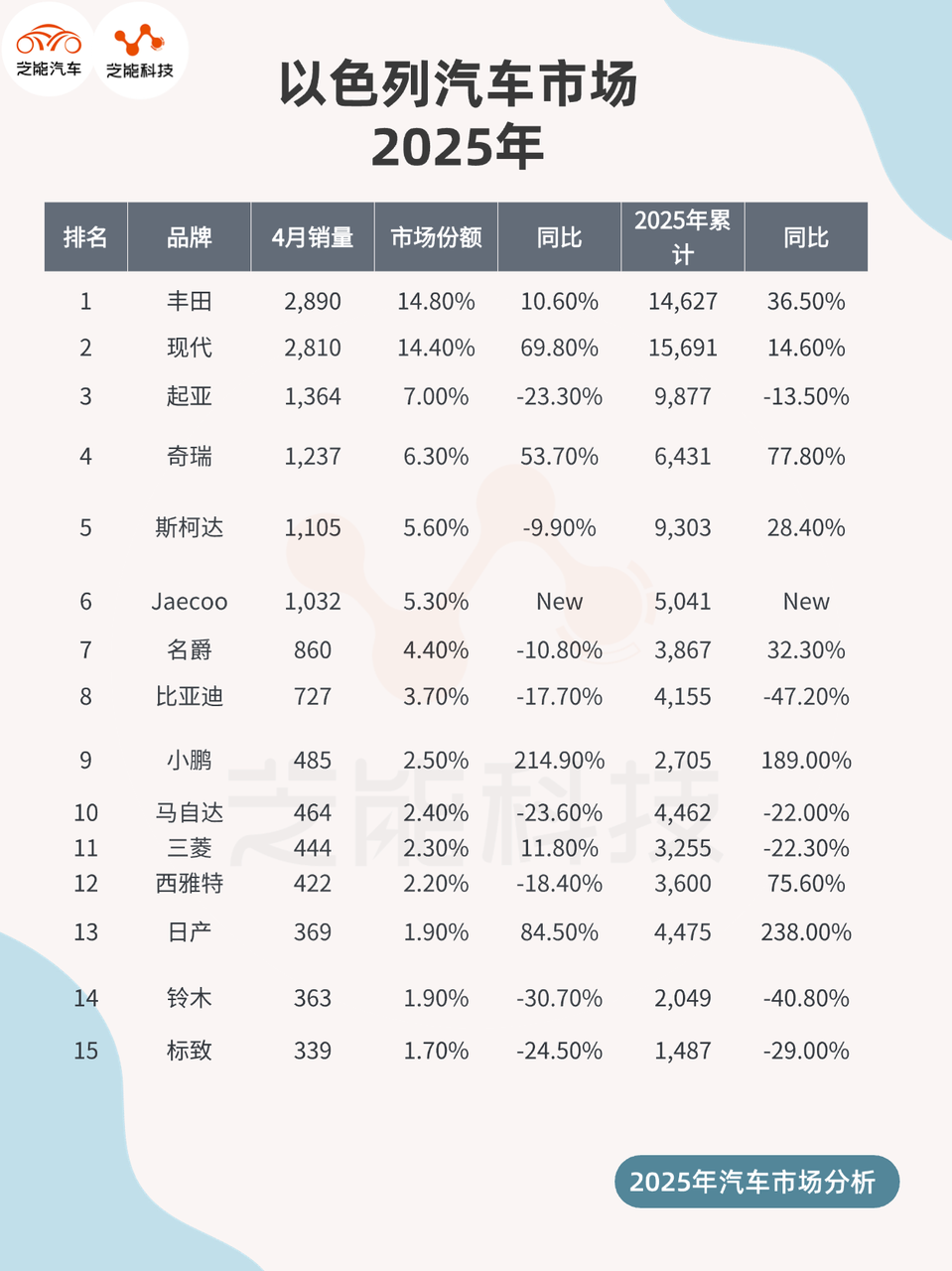
◎ Notably, Chery surged to fourth place with 1,237 vehicles sold, a 53.7% year-on-year increase, overtaking Škoda and becoming the sole Chinese brand in the top five. Including JAECOO in the Chery Group's total, the number reaches 2,269, ranking third after Hyundai-Kia and Toyota.
Other highlights include: ◎ JAECOO surpassed a 5.3% share for the first time in a single month, ranking sixth. ◎ MG fell to seventh, down 10.8% year-on-year. ◎ BYD declined by 17.7% year-on-year, ranking eighth with a market share of 3.7%. ◎ XPeng ranked ninth with 485 vehicles sold, a year-on-year surge of 214.9%, maintaining a top-ten position for three consecutive months. ◎ Brands like Nissan and BMW showed signs of recovery with strong growth rates (+84.5%, +41.7%).
The activity of new energy and mid-to-high-end brands has surged, particularly intelligent electric vehicle brands like JAECOO, XPeng, and BYD, whose market share and growth trends indicate potential to outpace traditional fuel brands.
02
Rise of Chinese Brands
Launching the "Israeli Model" for Market Trials
As a technology-intensive and consumer-centric market in the Middle East, Israel has emerged as a key region for Chinese automotive brands to expand overseas in recent years.
April 2025 data reveals that Chinese brands have formed a clear clustering advantage, with Chery, XPeng, BYD, MG, Lynk & Co., Geely, Zero Run, Zeekr, Hongqi, Thalys, Maxus, Dongfeng, and others all performing impressively.
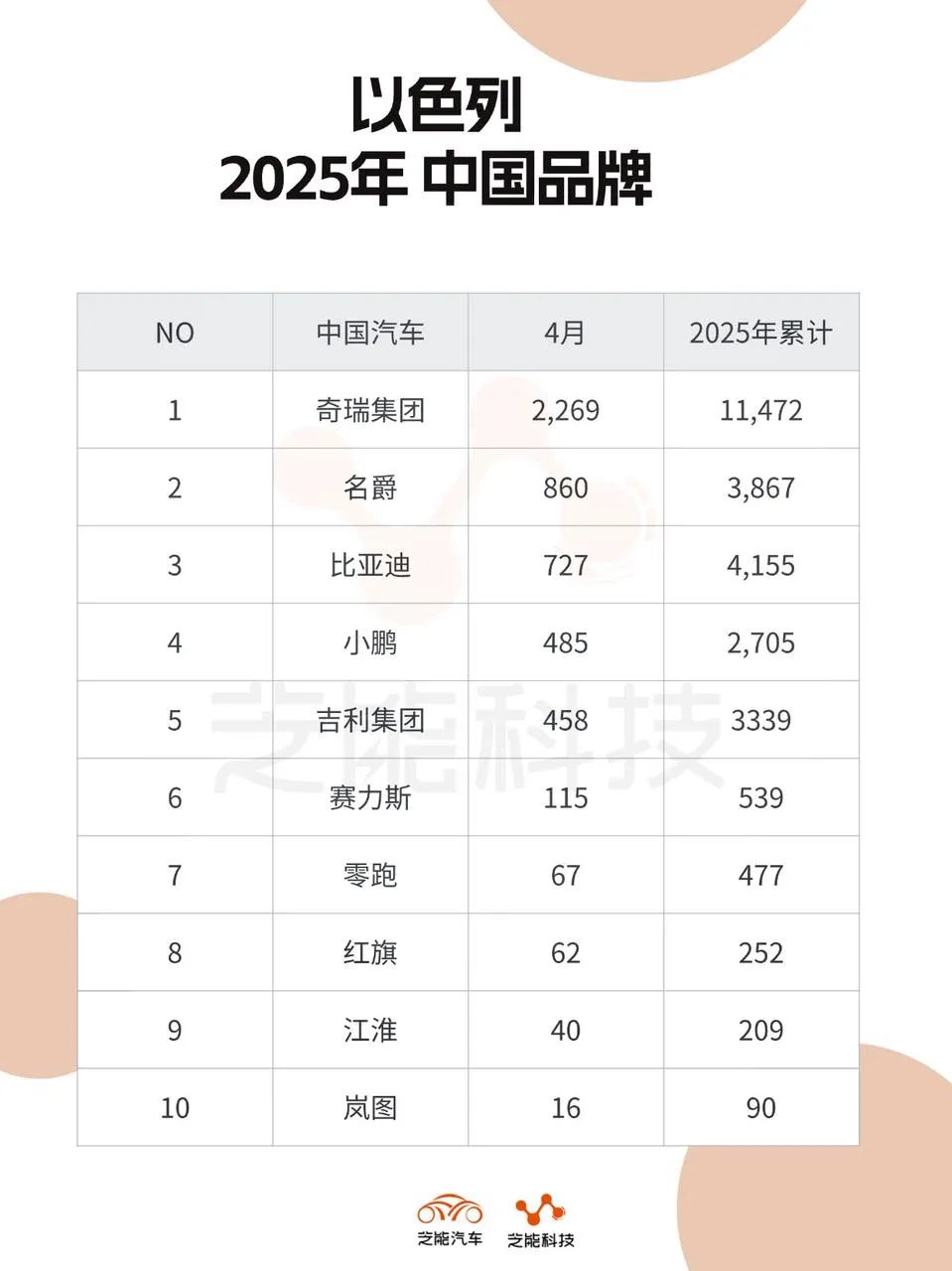
◎ The Chery Group firmly holds the lead with monthly sales of 2,269 vehicles and cumulative annual sales of 11,472, indicating a solid and strategic overseas presence.
◎ While BYD thrives in the domestic new energy market, it is still in the exploratory phase in Israel, with April sales of 727 vehicles and cumulative sales of 4,155, trailing behind Chery. Considering BYD's extensive model line-up and technological prowess, this performance suggests room for improvement in channel construction or localized operations.
◎ XPeng and the Geely Group have exhibited a "parallel trend" – XPeng sold 485 vehicles in April, with cumulative sales of 2,705, while Geely sold 458 vehicles in April, with cumulative sales of 3,339. XPeng has garnered attention with its intelligent branding, but its brand power and after-sales system still struggle to compete with Geely.
◎ Thalys (a deep partner of Huawei) and "second-tier" brands like Zero Run, Hongqi, JAC, and Voyah face greater challenges. For instance, Thalys's cumulative sales of 539 vehicles demonstrate that even with strong technical support, it's challenging to swiftly penetrate overseas markets, especially in the fiercely competitive new energy sector.
Overall, Chinese brands' share of the Israeli market has approached a quarter and is on a continuous growth trajectory.
Compared to policy barriers in European markets, Israel's relaxed stance towards new energy vehicles and consumers' high acceptance of technology brands make it a pivotal springboard for Chinese automakers to explore "high-quality overseas expansion".
From a product standpoint, the combination of intelligent electric vehicles and SUVs has become a common success strategy. Additionally, a multi-brand, multi-tier layout (such as Geely + Lynk & Co. + Zeekr) aids companies in penetrating diverse consumer segments at various levels.
Summary
The Israeli market is witnessing a systematic offensive by Chinese automotive brands. From Chery's robust rise to XPeng and Lynk & Co.'s intelligent demonstrations, to Hongqi and Zero Run's rapid starts, Chinese brands are no longer merely "entry-level and affordable" options but mainstream forces emphasizing both technology and product strength. For Chinese automakers, Israel is not just a sales breakthrough but also a crucial testing ground for the internationalization of product structure and brand value. In the view of ChiEnergy Technology, those who can successfully navigate the "intelligence + localization" path in the Israeli market will likely be the first to establish a global second growth curve.


